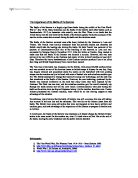General Rawlinson, the General in charge of the British soldiers on the Somme, was not happy about the attack, and did not agree with Haig that it was a necessary thing to do. ‘It does not appear to me that the gain of two or three more kilometres of ground is of much consequence, or that the existing situation is so urgent as to demand that we should incur very heavy losses in order to draw a large number of German reserve against this portion of our front.’ Here, Rawlinson is stating that he believes that the attack would be a waste of time and men, and that by attacking at the Somme; the British would lose a lot, and gain very little.
I think that it is very hard to list Haig as a good or bad commander. He was under tremendous pressure as Commander-in-Chief of the British Army, but I think that there were occasions where he made the wrong decision. He was a strong Christian, and so, he felt that he was sending the young men who got killed under his command to a better place, and that they were lucky to be killed, rather than remain on Earth. Although this obviously didn’t mean that he purposely sent his troops to places where they would be killed, it meant that he didn’t feel as bad about it as other commanders would.
General Rawlinson, in charge of the British forces at the Somme, said that Haig himself drew up the battle plans for the attack at the Somme, and seeing as the attack incurred heavy losses for the British, this suggests that Haig either wasn’t a good battle planner, or that he didn’t collect enough information about the German defences that would lead to a success for the British.
An extract from ‘The Western Front’ by Rosemary Rees reads: ‘Haig was a cavalry officer. He did not understand how to fight a war with infantrymen. His one tactic was to attack over and over again, no matter how little was gained or how many died.’
This tactic would probably have worked, but only in battles which took place years before! This was not organised warfare anymore, both sides were playing dirty, using tactics which went against the ‘Rules of War’, and changes in warfare need commanders who can adapt to these conditions, rather than use tactics which are well out of date. Using old tactics could only have one outcome; the deaths of the men under his command.
However, many people disagree with the argument that Haig was a bad commander, and they argue that there was no more that he could do; that it was a war of attrition and that there weren’t any tactics that could be put into use. In 1996, in a BBC documentary, the military historian Gary Sheffield said: ‘Haig was far from the idiot of the popular myth and the fact that his armies won the greatest of victories in British military history mean that we must take him seriously as a commander.’ Here, Sheffield is saying that Haig wasn’t as bad as everyone has made him seem, and that he can’t have been as bad as he is made out to be, because the Allies eventually won the war. I have to disagree with this, and argue that it was because of many other important factors that Germany lost World War One, the top five being those listed below:
*The Failure of the Schlieffen Plan
*The Supremacy of the British Navy
*The entry of the USA into the war in 1917
*The Introduction of the tank
*The failure of the 1918 German Offensive
I believe that these factors, along with the determination of the Allied armies brought about the end of World War One, and not the good leadership (if there was any) of Fieldmarshal Haig. I still hold my view that it is hard to say for definite whether Haig was a good or bad commander because of the pressure that he was under, but if I had to choose, I would have to say that he ignored the new tactics, the ‘fighting dirty’ which the Germans had introduced, and so his old-fashioned tactics condemned hundreds of thousands of British soldiers to their deaths.







